Key takeaways:
- Trade shows provide unique opportunities for networking, innovation, and collaboration among industry professionals.
- Effective follow-up after events is crucial for nurturing connections and exploring collaboration possibilities.
- Preparation, including setting goals and researching exhibitors, enhances the experience and maximizes opportunities at expos.
- Engaging in informal settings and using open-ended questions fosters genuine connections and meaningful conversations.
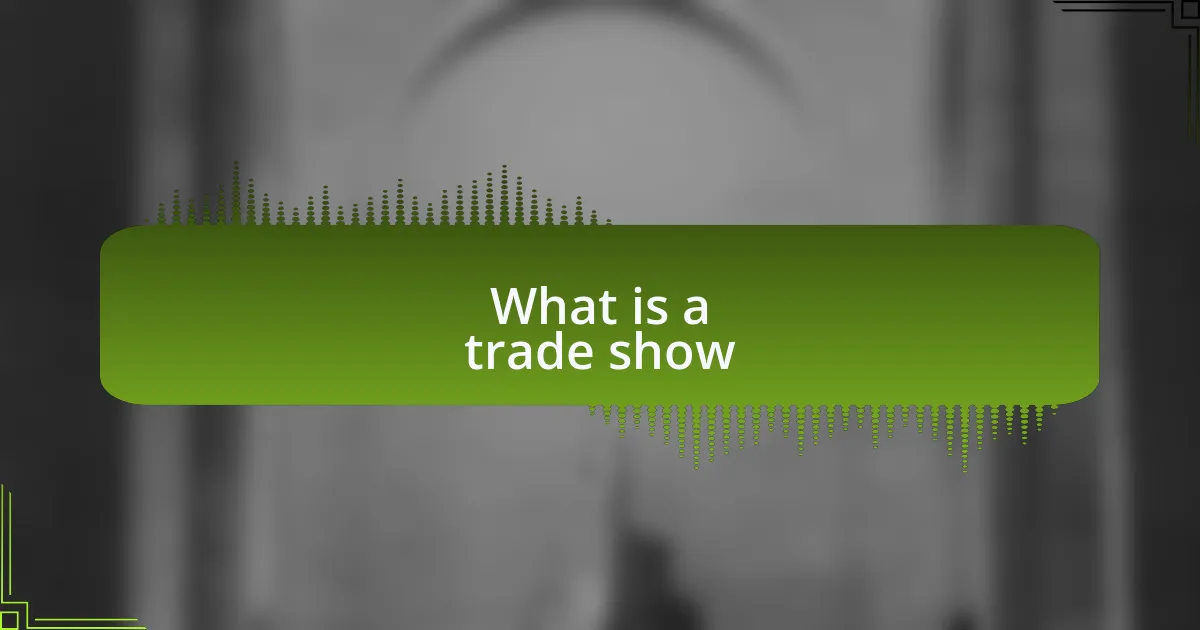
What is a trade show
A trade show is essentially a large event where businesses from a specific industry come together to showcase their products and services. I remember my first trade show vividly; it felt like stepping into a parallel universe where everyone shared the same passions and goals. I could feel the energy buzzing in the air, a shared excitement that connected strangers instantly.
These events serve as a platform for networking, innovation, and learning. Reflecting on those moments when I struck up conversations with industry leaders, I realized that these interactions often led to unexpected opportunities. Is there a better way to connect with like-minded professionals than in an environment designed for collaboration and discovery?
At trade shows, attendees can find everything from the latest tech innovations to educational sessions that deepen industry knowledge. I often found myself wandering the aisles, absorbing the creativity on display and thinking about how each new idea could transform my work. Don’t you think that sharing a space with pioneers and visionaries can spark ideas that might not surface in the everyday grind?
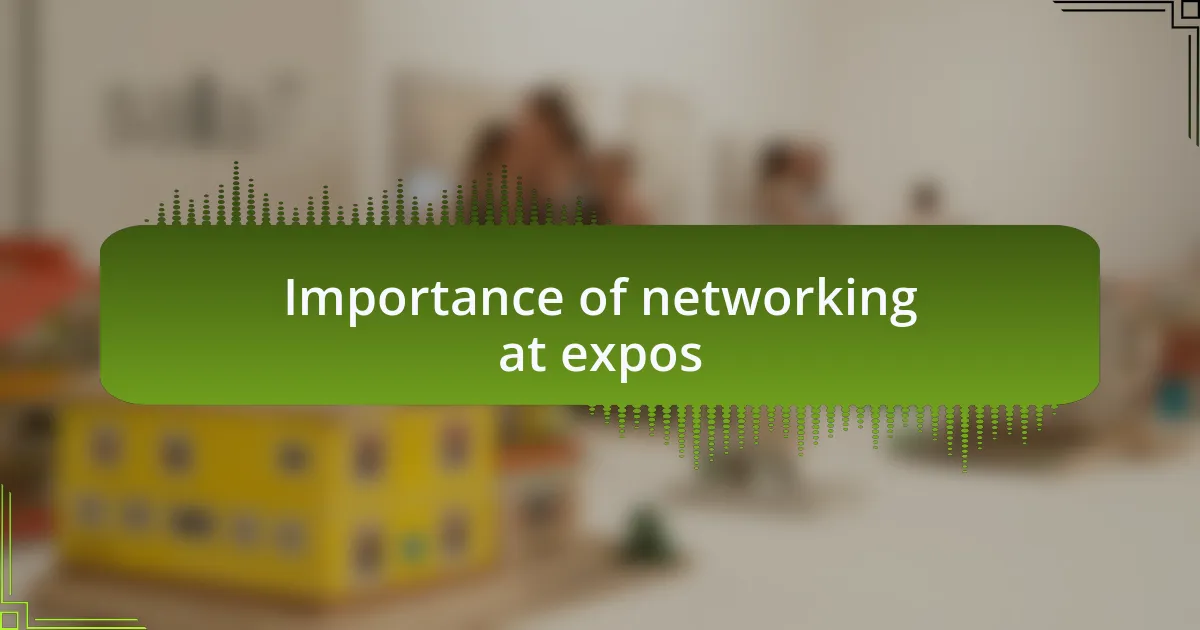
Importance of networking at expos
Networking at expos is crucial because it creates a unique opportunity to meet industry peers face-to-face. For instance, during one expo, I struck up a casual chat with someone at a booth and ended up discussing a collaborative project that later blossomed into a successful venture. Isn’t it fascinating how a simple conversation can lead to significant professional growth?
Moreover, I often find that these connections lead to mentorship opportunities. At one event, I encountered a seasoned expert who took a genuine interest in my work. Their guidance and insights not only enriched my understanding of the industry but also provided me with the confidence to pursue avenues I hadn’t considered before. Have you ever felt that you gained invaluable knowledge simply by interacting with someone who has walked the path before you?
Lastly, networking helps build a sense of community within the industry. I recall attending a roundtable discussion where I realized that others face similar challenges as I do. By engaging in these conversations, I felt a renewed sense of purpose and camaraderie, which I think is essential in an industry that thrives on collaboration and support. Don’t you agree that feeling connected to others can elevate your passion for the work you do?
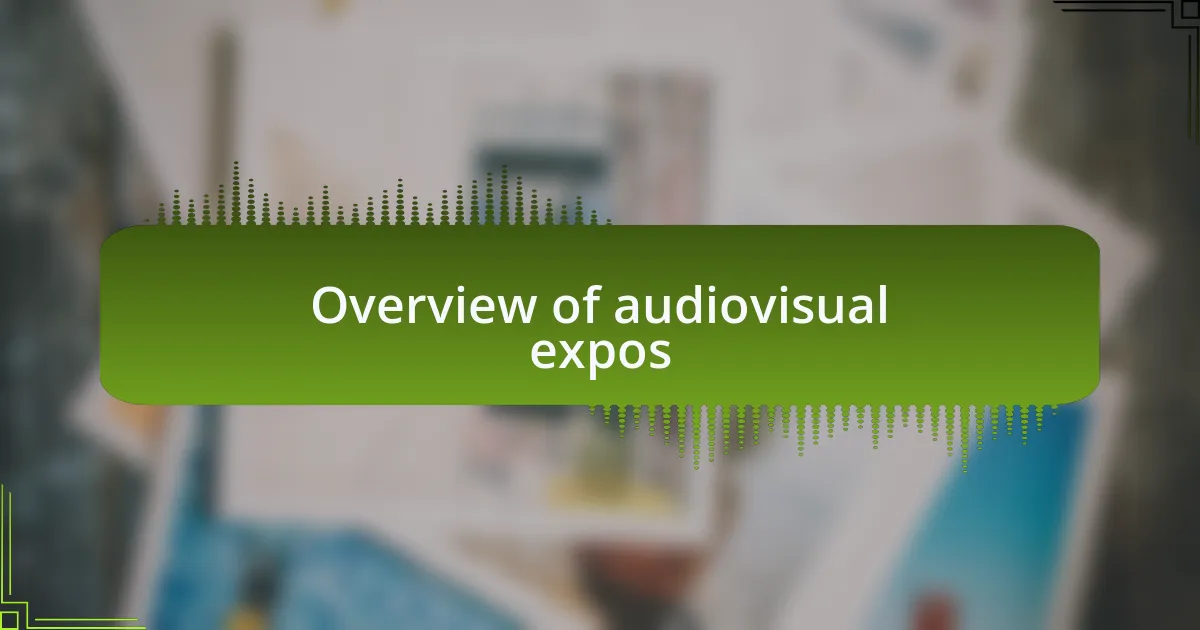
Overview of audiovisual expos
Audiovisual expos serve as a vibrant hub where innovative technology meets artistic expression. I still recall walking through the aisles filled with cutting-edge displays, each booth beckoning with its own unique offerings. It felt exhilarating to see the latest advancements in sound and visual systems, all while connecting with passionate professionals who share a love for this dynamic field.
In my experience, these expos are more than just showcases; they’re a chance to engage with the future of the industry. At one such event, I stumbled upon a groundbreaking projection mapping demo that completely captivated my attention. After speaking with the developers and sharing my own experiences, I walked away not only inspired but also with fresh ideas for my projects. Have you ever left a trade show feeling like you’ve just uncovered a treasure trove of possibilities?
The atmosphere at audiovisual expos is charged with excitement and potential, fostering a sense of collaboration among attendees. I’ve had countless conversations that transformed into brainstorming sessions, leading to partnerships that I hadn’t imagined before. Isn’t it amazing how a shared passion can ignite creativity and lead to unexpected opportunities? These interactions can truly redefine our understanding of what’s possible in the audiovisual landscape.

Preparing for an audiovisual expo
Preparing for an audiovisual expo requires a clear plan. I often start by setting specific goals for what I hope to achieve—whether it’s networking with industry leaders or discovering the latest technology. Have you ever felt overwhelmed by the multitude of options? Establishing these objectives helps me focus my energy on meaningful interactions.
I also make it a priority to research exhibitors beforehand. Knowing which booths I want to visit allows me to maximize my time. For instance, at a previous expo, I discovered an innovative sound company that wasn’t on my radar. This preparation paid off, as I ended up forming a valuable partnership that significantly enhanced my projects.
Lastly, packing the right materials is crucial. I bring plenty of business cards and a notepad to jot down ideas and contacts. During my first trade show, I underestimated the importance of follow-ups. Learning from that experience, I’ve made it a habit to connect with each individual I meet. Have you considered how simple it is to make a lasting impression by just following through? It’s a habit that has transformed my networking approach.
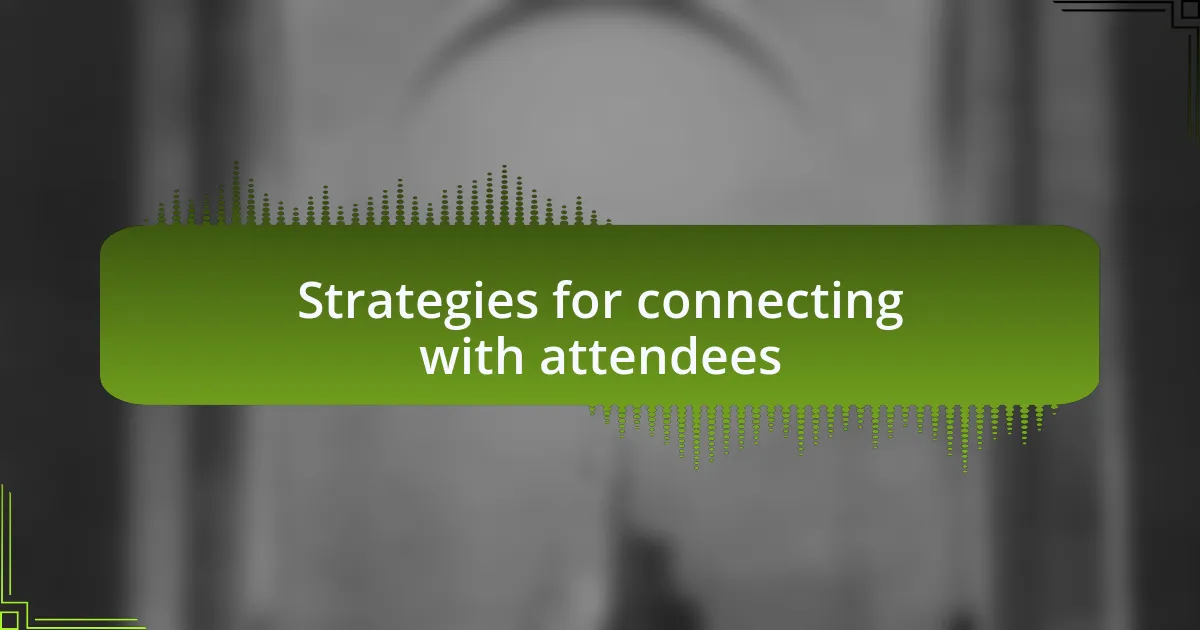
Strategies for connecting with attendees
When I’m at a trade show, one of my go-to strategies is to initiate conversations by asking open-ended questions. For example, instead of just introducing myself, I’ll ask attendees what inspired them to come to the expo. This approach often opens up a dialogue that feels natural and engaging. How often do you find yourself in conversations that feel more like a monologue? By inviting others to share their stories, I’ve not only learned valuable insights but also fostered genuine connections.
Another effective strategy is leveraging social media before and during the event. I typically post updates and share my thoughts about specific sessions or products. This not only positions me as an engaged participant but also draws in others who resonate with my interests. I recall one instance when someone reached out to me via Twitter because they noticed I was attending the same panel discussion. That spontaneous meetup turned into a collaboration that I’m grateful for to this day. Have you ever thought about the power of digital platforms in fostering real-life interactions?
Lastly, I always make it a point to attend networking events or mixers associated with the expo. These settings feel less formal and allow for relaxed conversations. During my last audiovirtual expo, I met a group of professionals over coffee, and we ended up discussing our favorite new technologies for hours. It’s in these informal settings that I find people are more open to sharing their experiences and insights. Isn’t it interesting how the right atmosphere can make all the difference in connecting with others?

Following up after the event
Following up after a trade show is crucial for nurturing the connections you’ve made. I remember one year when I collected a stack of business cards but waited too long to follow up. By the time I reached out, a few of those contacts had already moved on to new positions or industries. Have you ever faced a similar situation? A timely follow-up can make all the difference in keeping those connections alive.
I usually set reminders to send personalized messages within a week after the event. For instance, I once wrote a short note to someone I’d met during a panel discussion, referencing a specific point that resonated with us both. The response was overwhelmingly positive, and we ended up scheduling a coffee chat to explore potential collaboration. Isn’t it amazing how a little personalization can reignite a conversation?
Additionally, I often share resources that could benefit those I met. After one expo, I discovered an article that aligned perfectly with the interests of a fellow attendee. When I sent it to them, it not only sparked discussion but also highlighted my genuine interest in their field. How often do we take the time to share knowledge that can help others? This simple act of sharing can fortify connections and lay the groundwork for future collaboration.
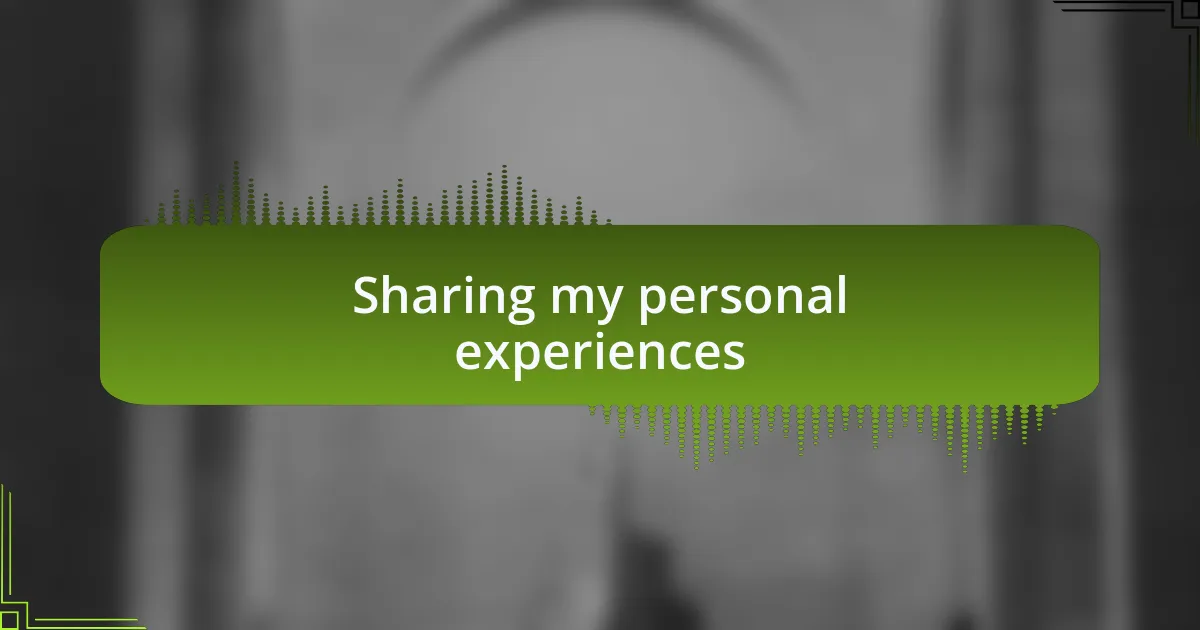
Sharing my personal experiences
Attending trade shows has always felt like stepping into a vibrant marketplace of ideas for me. I remember feeling overwhelmed the first time I navigated through aisles filled with booths and eager exhibitors. The energy was palpable, and I made it a point to introduce myself to as many people as I could. Did I ever think I would meet industry leaders simply by sparking small conversations about shared interests? Each connection sparked a sense of possibility that resonated deep within me.
One memorable encounter was with a fellow attendee who stopped by my booth. I shared my insights on a recent project, and she seemed genuinely intrigued. We ended up discussing our struggles and successes over a cup of coffee. The depth of that conversation surprised me; it felt less like networking and more like a meaningful exchange of experiences. Isn’t it in those unguarded moments where the strongest relationships are forged?
I always carry a notebook during these events, jotting down reflections right after conversations. One time, I wrote about a discussion I had regarding the evolution of audio technology. When I revisited those notes later, I realized how valuable those insights could be, not just for me but for my colleagues. Sharing those reflections helped me solidify my learning and keep the dialogue alive long after the show ended. How often do we document our experiences to revisit and grow from them? Each note felt like a stepping stone toward building a robust network.